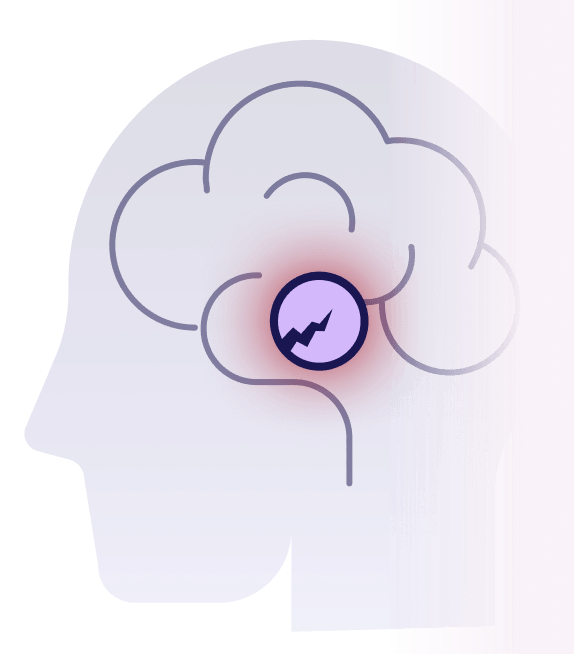Learn About HO
A different kind of obesity

What is acquired HO?
Acquired hypothalamic obesity (acquired HO) is a condition that affects weight and hunger in many brain tumor survivors.
If you or someone you love is struggling with weight gain, constant hunger, and fatigue, it could be acquired HO.

“I went into surgery, and I came out, and it was like I was turned into a different person…mentally and physically.” -Brain tumor survivor living with acquired HO
Actor portrayalsWhat causes acquired HO?
Acquired HO is caused by injury to the hypothalamus, a key control center in the brain.

Common Causes:
- Brain tumors (like craniopharyngioma)
- Brain tumor treatment (like surgery or radiation)
Other causes:
- Traumatic brain injury
- Stroke
- Other neurological conditions
Acquired HO is a distinct and diagnosable medical condition. It’s important to know that changes in weight or hunger associated with acquired HO are the result of an injury to your hypothalamus—not something you caused.
What makes it “acquired”? HO is acquired if it occurs because a person’s hypothalamus gets injured. If a person is born with a brain abnormality that causes HO, it is called "congenital" HO, though this is less common.

You don’t have to navigate acquired HO alone.
A Rhythm Patient Education Manager (PEM)* can provide one-on-one disease education support to help you better understand acquired HO and prepare for conversations with your doctor.
Patient Education Managers are employees of Rhythm Pharmaceuticals and do not provide medical care or advice. We encourage you to always speak to your healthcare providers regarding your medical care.
What makes acquired HO unique?
Weight gain from acquired HO is directly linked to an injury to the hypothalamus that affects the brain’s ability to manage weight, hunger, and how calories are used.
Specific challenges of acquired HO
Increased
hunger
Decreased energy
expenditure
Weight gain that is sustained over time
Unlike in other types of obesity, two unique factors contribute to weight gain in acquired HO:
- Hunger that can be constant and hard to control, which is called hyperphagia (pronounced hi-per-FAY-juh)
- Decreased energy expenditure, which is when the body uses fewer calories than it should each day. You can also think of this as having a slower metabolism
These two factors can lead to weight gain that is sustained over time and does not respond to diet or exercise.
Learn more about what causes weight gain in acquired HOChanges in hunger can vary from person to person
Most people with acquired HO experience some level of increased hunger, and around 70% experience the constant, hard-to-control hunger called hyperphagia. However, some people may not notice any change in hunger.

“Immediately after the surgery, I was ravenously hungry. I gained 20 pounds in two weeks, and that was on just what the hospital was feeding me. I was hungry a lot, and I have struggled with fatigue ever since then.”-Brain tumor survivor living with acquired HO
Acquired HO can impact many aspects of peoples’ lives
There’s more to acquired HO than just weight gain. Living with acquired HO can make day-to-day life emotionally and socially challenging. Acquired HO may also lead to an increased risk of various health problems over time.
Emotional burden
- Frustration with difficulty losing weight
- Poor body image
- Fewer positive social interactions
- Negative impact on mental health
Potential long-term risks
- Diabetes
- High blood pressure
- Heart disease
- Liver disease
Acquired HO is diagnosed by a doctor
Tell your doctor about the symptoms you experience. The earlier acquired HO is diagnosed, the sooner you and your doctor can make a plan to manage it.
Find a doctor whospecializes in acquired HO
The selection of a healthcare provider is an important decision that you should consider carefully. The Healthcare Provider Locator Tool is for information purposes only. The information in the Healthcare Provider Locator Tool is provided solely by the listed healthcare providers and has not been verified by Rhythm Pharmaceuticals. Rhythm Pharmaceuticals makes no representations or warranties regarding, and shall not be responsible for, the competencies or skill level of any of the providers listed on the Healthcare Provider Locator Tool or the quality of their care. Please see Terms of Use of the Healthcare Provider Locator Tool for more information.
Looking for more information about acquired HO?
Sign up to get emails with information and updates about acquired HO delivered to your inbox.
Sign Up